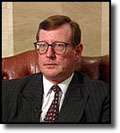
|
Ulster Unionist Party
According to the Ulster Unionist Council's 1989 Constitution, the movement's objectives reiterate its original aims from 1905: These include commitments to:
The last Unionist leader to be Northern Irish Prime Minister was Brian Faulkner. In the early 1970s, in the midst of multi-lateral talks between the Republic of Ireland and UK Governments, and the Ulster Republican and Unionist parties, splits within the Unionist movement appeared. Some backed Faulkner's power-sharing policy while others opposed the British Government's proposals. Following the internal turmoil, Faulkner resigned and was replaced by Harry West. Mr West forged links with Vanguard and the Democratic Unionist Party but under his leadership, the UUP distanced itself from the Conservatives. The Unionists had had long-standing links with the Conservative Party: converging on policy decisions and their common aversion to socialism and the Labour party. Unionist MPs in the UK Parliament took the Tory whip until it was withdrawn by Edward Heath after the February 1974 General Election. For a short period, the UUP's role at Westminster was strengthened by its newly independent position in the UK Parliament. Under James Molyeaux's leadership, the UUP took part in the Northern Ireland Assembly at Stormont until it was dissolved in June 1986. The Ulster Unionist Council had continued to keep loose links to the UK Conservative Party, in the hope that the Tories would become more pro-unionist. However, Mrs Thatcher's signing of the Anglo-Irish agreement in November 1985 antagonised the Unionists and the UUP felt compelled to distance itself further from the Conservatives. By the mid-1990s, the Unionists' role in the UK Parliament had strengthened, particularly as John Major's government, with its small - and then negative - majority, relied on their support to get legislation through the House. At the 1997 General Election, the UUP fielded 16 candidates out of 18 Ulster seats. Still the largest party in Northern Ireland, it gained ten seats, one more than in 1992. The party secured 32.7% of all Northern Irish votes. All but one of its sitting MPs had re-contested their seats: James Molyneaux retired and Jeffrey Donaldson was elected in his place. UUP MPs elected in 1997:
Roy Beggs (Antrim East) Party Headquarters:
3 Glengall Street Tel: 01232 324601
Ulster Unionist Party Home Page
|
Diana, Princess of Wales, 1961-1997
Conference 97
Devolution
The Archive
News |
Issues |
Background |
Parties |
Analysis |
TV/Radio/Web
Interactive |
Forum |
Live |
About This Site
News |
Issues |
Background |
Parties |
Analysis |
TV/Radio/Web
Interactive |
Forum |
Live |
About This Site
© BBC 1997 |
politics97@bbc.co.uk |
